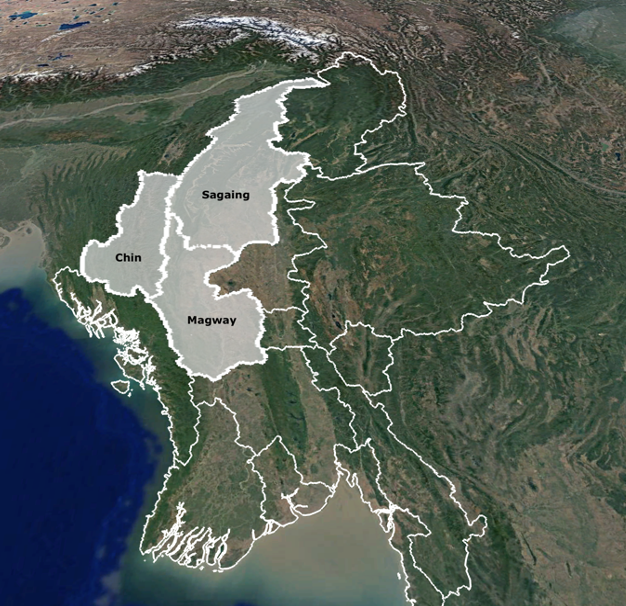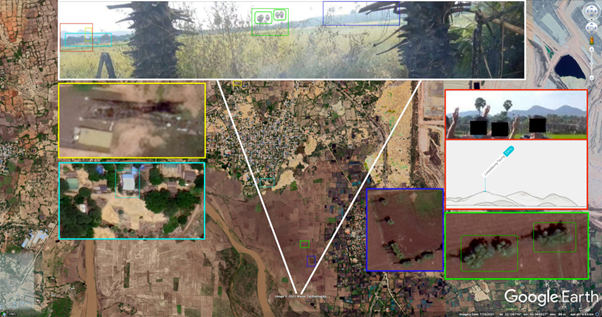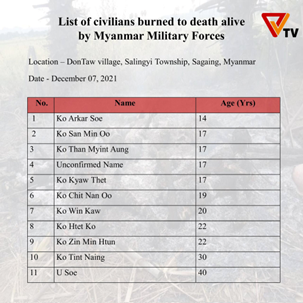During Myanmar Witness’ investigation into fires and military activity in the North-West regions of Sagaing (စစ်ကိုင်းတိုင်း), Chin (ချင်းပြည်နယ်) and Magway (မကွေးတိုင်း), reports of civilian harm and multiple violent deaths emerged.
Following on from Myanmar Witness’ jointinvestigation with the BBC into killings in Kani Township, Sagaing (စစ်ကိုင်းတိ) in May 2021, Myanmar Witness has identified and analysed a number of incidents involving the discovery of significant numbers of corpses, allegedly the victims of mass killings by the Myanmar military. Each of these followed reports of anti-regime protests and clashes between the military and defence forces in the local area.
This short article provides an overview of Part Two of Myanmar Witness’ report ‘Civilian Harm: An investigation into the impact of two military operations in North-West Myanmar’. This analysed and verified evidence of multiple killings in the same areas that the military operations widely known as Anawrahta (အနော်ရထာ စစ်ဆင်ရေး) and Alaungmintayar (အလောင်းမင်းတရား စစ်ဆင်ရေး) occurred.
Part One revealed how the use of fire and destruction of villages in these North-West regions aligned closely with these military operations. To read the full report, download the PDF here.

Figure 1: Geographic boundaries of Sagaing (စစ်ကိုင်းတိုင်း), Magway (မကွေးမြို့) and Chin (ချင်းပြည်နယ်).
Killings of multiple people
Myanmar Witness verified three separate incidents alleged to be mass killings committed by the Myanmar military in the north-west region:
18 people found dead in Myin Thar (မြင်သား), Gangaw (ဂန့်ဂေါ) Township, Magway (မကွေးမြို့) in September 2021 (partially verified). The dead reportedly included minors, the elderly and the physically disabled.
11 people found dead in Done Taw (ဒုံးတော), Salingyi (ဆားလင်းကြီး), Sagaing (စစ်ကိုင်းတိ) in December 2021 (fully verified). The dead reportedly included minors and an elderly women.
Six people found dead in Thit Seint Gyi (သစ်ဆိမ့်ကြီး), Wetlet (ဝက်လက်) township, Sagaing (စစ်ကိုင်းတိ) in January 2022 (fully verified).
This summary report focuses on the case study of Salingyi (ဆားလင်းကြီး) Township in the Sagaing (စစ်ကိုင်းတိုင်း) Region. To read the other case studies, download the full report.
Salingyi Township, Sagaing – December, 2021 (fully verified)
Background
[Warning: Graphic] On 7 December 2021, Myanmar military troops reportedly raided the village of Done Taw (ဒုံးတော), Salingyi (ဆားလင်းကြီး) Township in Sagaing (စစ်ကိုင်းတိုင်း) Region. . This was, according to a report by Myanmar Now, following a mine ambush on military vehicles on the Monywa-Pathein highway near North Yamar bridge, located about 300 metres from the village. Salingyi (ဆားလင်းကြီး) is an area which was reportedly targeted by a convoy-centred military operation in November 2021. Salingyi (ဆားလင်းကြီး) residents have reportedly engaged in anti-regime protests – one of which occurred just days before this incident.
Locals interviewed by Myanmar Now state that military soldiers entered the village from near the Pathein-Monywa road at 0800. Done Taw (ဒုံးတော) has only one entrance and exit route, through the Shwe Myin Tin farm on the bank of the Chindwin River. According to villagers and a local PDF leader (reported by Myanmar Now and The Irrawaddy), 11 villagers were reportedly captured, set on fire, and burned to death. A video uploaded to social media by various media outlets shows the aftermath of the attack, including the burnt remains of bodies (graphic footage – available on request). The video’s voiceover states: “They were shot and stabbed while forced to kneel, with their hands tied”.
Verification
Myanmar Witness can verify that the location where these bodies were found was just outside of Done Taw (ဒုံးတော) village, in farmland located at 22.142916, 95.062057 (Figure 48). However, it cannot be verified that this was the area where the people were killed, whether they had their hands tied, or whether they were dead before or after the fire started.

Figure 2: Geolocation of the original Done Taw video, from a background landscape.
It’s also reported by the Irrawaddy, as well as elsewhere online, that a Done Taw (ဒုံးတော) resident, Daw Win Yi, who was over 50, was also killed by the Myanmar military in farmland outside the village. While images of a deceased elderly woman have been collected, Myanmar Witness could not verify where these particular photos were taken.
According to the official NUG twitter account, the NUG were supplied with a victim’s list by a local PDF group (Figure 49). This included four victims under the age of 18 : Arkar Soe (14), Hsan Min Oo (17), Than Myint Aung (17), Kyaw Thet (17). Most of the victims were unrecognisable as a result of the impact of the fire, except for 17-year-old Than Myint Aung, who was identifiable from his ear piercing, according to Myanmar Now.

Figure 3: Names of dead individuals from the Done Taw incident as reported to the NUG by a local PDF group.
To read the other two case studies, download the full report here.
Conclusion
Through a detailed investigation, this report demonstrates the grave civilian impacts of military operations in north-west Myanmar. The widespread destruction of communities along military routes represents a worrying trend. The verified reports of civilian deaths, which eye witnesses attribute to the military, indicates the precarious situation everyday citizens face across Myanmar.
Myanmar Witness is still verifying footage related to further alleged killings in the north-west and other regions. These will be documented in a forthcoming report. Many trends documented in this report have been seen across the country more broadly, for example, see Myanmar Witness’ published reports:Burning Myanmar,Moso Village Christmas Eve Killings, andUsing Pamphlets for Propaganda, Misinformation, Intimidate and Division.
To read a summary of Part One of the report – on the use of fire and the destruction of civilian property – go to the reports page of the Myanmar Witness website. To read the full report, download the PDF.
Myanmar Witness continues to document and investigate evidence of possible human rights abuses in Myanmar. These findings will be made available on the Myanmar Witness website, as and when they are completed.


